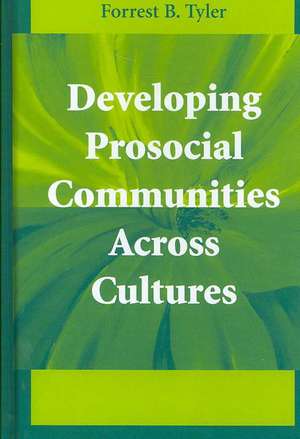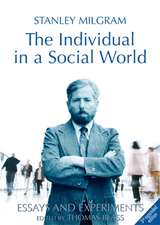Developing Prosocial Communities Across Cultures
Autor Forrest B. Tyleren Limba Engleză Hardback – 27 sep 2007
| Toate formatele și edițiile | Preț | Express |
|---|---|---|
| Paperback (1) | 381.21 lei 6-8 săpt. | |
| Springer – 29 oct 2010 | 381.21 lei 6-8 săpt. | |
| Hardback (1) | 388.52 lei 6-8 săpt. | |
| Springer – 27 sep 2007 | 388.52 lei 6-8 săpt. |
Preț: 388.52 lei
Nou
Puncte Express: 583
Preț estimativ în valută:
74.34€ • 81.01$ • 62.65£
74.34€ • 81.01$ • 62.65£
Carte tipărită la comandă
Livrare economică 23 aprilie-07 mai
Preluare comenzi: 021 569.72.76
Specificații
ISBN-13: 9780387714844
ISBN-10: 0387714847
Pagini: 164
Ilustrații: XII, 164 p.
Dimensiuni: 155 x 235 x 11 mm
Greutate: 0.43 kg
Ediția:2007
Editura: Springer
Colecția Springer
Locul publicării:New York, NY, United States
ISBN-10: 0387714847
Pagini: 164
Ilustrații: XII, 164 p.
Dimensiuni: 155 x 235 x 11 mm
Greutate: 0.43 kg
Ediția:2007
Editura: Springer
Colecția Springer
Locul publicării:New York, NY, United States
Public țintă
ResearchCuprins
Definitions and Background Issues.- Psychosocial Integration: The Theoretical Framework.- The Current Situation: Psychologists’ Approaches to Community Change.- The Prosocial Effect of Changing One Aspect of a Community.- The Prosocial Effect of Coordinating Change in Two Aspects of a Community.- A Guide for Establishing Prosocial Communities.- Questscope: A Comprehensive Prosocial Community Program.
Recenzii
From the reviews:
"Developing Prosocial Communities Across Cultures dares to take a step toward the daunting task of repairing communities broken down by ‘antisocial’ … attitudes and behaviors. … the beauty of this work is in its groundbreaking consideration of the complexities of individuals and their behaviors, integrated within social, economic, and political systems. … This is an important work for students of social capital, social psychology, and community-based organizations seeking the benefits but difficulties of collective change in the form of risk reduction or community problem solving." (Tanya Telfair Sharpe, PsycCRITIQUES, Vol. 53 (17), April, 2008)
"Developing Prosocial Communities Across Cultures dares to take a step toward the daunting task of repairing communities broken down by ‘antisocial’ … attitudes and behaviors. … the beauty of this work is in its groundbreaking consideration of the complexities of individuals and their behaviors, integrated within social, economic, and political systems. … This is an important work for students of social capital, social psychology, and community-based organizations seeking the benefits but difficulties of collective change in the form of risk reduction or community problem solving." (Tanya Telfair Sharpe, PsycCRITIQUES, Vol. 53 (17), April, 2008)
Textul de pe ultima copertă
Skillfully combining psychological knowledge and humanitarian wisdom, Developing Prosocial Communities across Cultures shows how nurturing environments can be rooted in the common concerns of people and institutions, while giving readers the steps toward achieving this goal. Psychologist/activist Forrest Tyler emphasizes individuals’ collective responsibilities—to themselves, each other, and society—and describes a coordinated balance of discrete social changes brought about by civic action, policy changes initiated by officials, and collaboration between professionals and the community. Instructive examples from locales as varied as Colombia, Jordan, and the United States offer models from which readers can form unique, innovative solutions. And the author’s multicultural/ multiethnic approach clearly maps out the road from theoretical concepts to real-world action:
- Defining the prosocial community—core characteristics and elemental relationships.
- Observing communities: assessing their potential for intervention, determining change objectives.
- Thinking beyond traditional psychological/mental health approaches to community change.
- Prosocial effects of community projects involving multiple levels of action.
- Questscope: an extended example of community change in the Hashemite Kingdom of Jordan
Caracteristici
Incorporates a multicultural, multiethnic approach with documentary research and programmatic support for its efficacy Identifies and demonstrates the nature of the links between community and individual functioning in ways that aid readers in understanding them Provides examples to enable people seeking community changes to know how to effectively translate these ideas into practice








